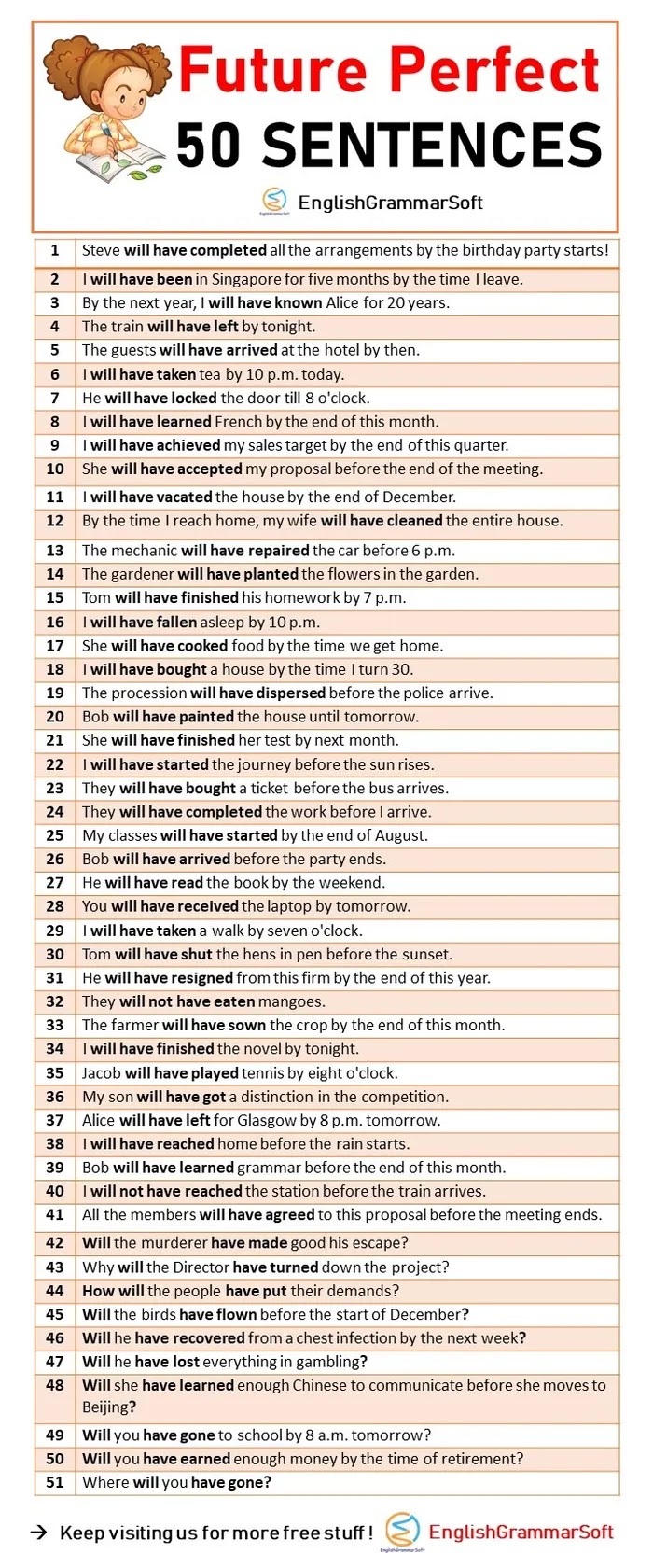Verb tenses in English Grammar may refer to present, past, and future time. Knowing verb tenses is necessary to make proper sentences.
There are three basic types of tenses, past, present and future tense. These are based on the idea of the time in the given sentence when the action takes place.
Each of these three types has further four sub-types. Today, we are going to explain these tenses.
PRESENT TENSE
Definition: A verb that refers to the present time is said to be in the present tense. The present tense has four types.
Simple Present Tense (Present Indefinite Tense)
Definition
Simple present tense is used to express general statements and describe the usual and habitual acts. It shows the routine work that we perform daily, regularly or always.
Formula / Structure
Subject + Base form of verb (+ s/es for third person) + object
He/She/It + base form(V1)(s/es)
They/We + base form(V1)
Examples
- He wakes up early in the morning.
- We work in the office from 8 o’clock to 3 o’clock.
- She loves cooking continental food.
Present Progressive/Continuous Tense
Definition
Present progressive tense is used to describe the action that is happening at the time of speaking.
Formula / Structure
Subject + is/am/are + present participle + object
I + am
He/She/It + is
They/We + are
Examples
- He is eating a burger.
- They are eating burgers.
- It is raining.
Present Perfect Progressive/Continuous Tense
Definition
It is used to indicate the action that began in the past and is still continuing.
Formula /Structure
Subject + has/have been + present participle + object + since/for + time reference
He/She + has been reading book for one hour.
They/We/I + have been reading book for one hour.
Examples
- It has been raining for the last two hours.
- I have been waiting here since morning.
PAST TENSE
Definition: A verb that refers to the past time is said to be in the past tense. The past tense has four types.
Simple Past Tense (Past Indefinite Tense)
Definition
It is used to indicate an action or act in the past.
Formula / Structure
Subject + Verb(+ed) or irregular verb (V2) + object
He/She/It/I/We/They + V2
Examples
- I played the game.
- He read the book.
- It rained yesterday.
Past Progressive/Continuous Tense
Definition
Past progressive tense expresses the action going on at some point in the past.
Formula / Structure:
Subject + was/were + present participle(V1+ing) + object
He/She/It + was
We/They + were
Examples
- I was reading a book when the bell rang.
- She was cooking the meal when guests arrived.
Past Perfect Tense
Definition
Past perfect tense is used to describe the action completed at some point in the past.
Formula / Structure:
Subject + had + past participle (V3) + object
Subject + had + V3
Examples
- I had finished my work when the doorbell rang.
- They had taken their meal before the guests arrived.
Past Perfect Progressive/Continuous Tense
Definition
The past perfect progressive tense is used to describe an action that had been going on for some time and finished at some definite time in the past.
Formula / Structure
Subject + had been + present participle + object + time reference
He/She/It/I/We/They + had been
Examples
- I had been doing my homework for two hours.
- It had been raining since morning.
FUTURE TENSE
Definition: A verb that refers to future time is said to be in the future tense. The future tense has four types.
Simple Future Tense (Future Indefinite Tense)
Definition
It is used to describe a single act that has still to take place.
Formula / Structure
Subject + will/shall + base form(V1) + object
He/She/It/I/We/They + will/shall + V1
Examples
- It will rain tomorrow.
- The will leave for Glasgow next Monday.
Future Progressive/Continuous Tense
Definition
It is used to describe the action as going on at some point in the future.
Formula / Structure
Subject + will be + present participle + object
Am/is/are + going to be + present participle
Examples
- He will be watching the TV at 8 pm.
- He is going to be watching the TV at 8 pm.
Future Perfect Tense
Definition
It is used to describe an action that will be completed at some specific future time/date.
Formula / Structure
Subject + will have + past participle (V3) + object
Am/is/are + going to have + past participle
Examples
- He will have played the game.
- He is going to have played the game.
Future Perfect Progressive/Continuous Tense
Definition
It is used to describe an action which has been going on continuously and has yet to be completed in the future.
Formula / Structure
Subject + will have been + present participle + object + time reference
Am/is/are + going to have been + present participle
Examples
- I will have been watching the TV for over one hour before you join me.
- I am going to have been watching the TV for over one hour before you join me.













Комментариев нет:
Отправить комментарий